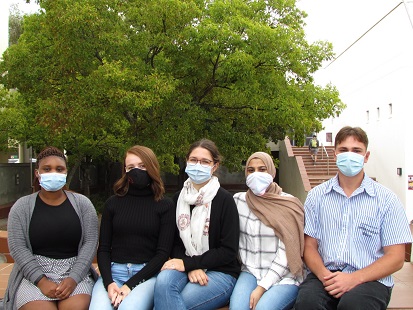With an estimated 5.6 trillion cigarette butts discarded every year, smoking has in more ways than one become one of the leading causes of environmental pollution in the world.
Now a group of third year microbiology students from Stellenbosch University (SU) have determined that even so-called environmentally-friendly biodegradable cigarettes can have unintended consequences.
The group, consisting of Elizaveta (Lisa) Koroleva, Aza Mqulwa, Scott Norris-Jones, Sidney Reed and Zahraa Tambe, did so well in their final year project that their findings have now been published in the journal Environmental Science and Pollution Research.
Cigarette filters are made of a plastic called cellulose acetate. When you toss that cigarette butt onto the ground, you are dumping plastic, as well as the nicotine, heavy metals and many other chemicals it has absorbed, into the surrounding environment. Ironically, that very filter was originally developed to protect you from the harmful effects of smoking.
It can take between two to five years for a cigarette butt to break down into microplastics, all the time leaching heavy metals and chemicals into the environment. In an attempt to address the microplastics problem, several companies have started to manufacture “biodegradable" cigarettes, where the filters are made of natural materials such as hemp or cotton.
However, the students asked, if these biodegradable butts degrade so much faster than their plastic alternatives, would they then not have more of an impact on bacterial communities in soil, as that is where most cigarette butts land up?
With this question in mind, the team had to come up with a workable way of testing their hypothesis as part of the third year Microbial Ecology module in the Molecular Biology and Biotechnology programme at SU, and present their findings at a mock-up academic conference nine weeks later.
The group found that the leachate from both biodegradable and non-biodegradable cigarette butts contained the presence of elements such as Aluminum, Arsenic, Boron, Barium, Cadmium, Cobalt, Chromium, Copper, Iron, Mercury, Manganese, Molybdenum, Nickel, Lead, Antimony, Selenium, Tin, Strontium, Vanadium and Zinc.
The leachate from the biodegradable butts were found to contain much higher concentrations of these metals and metalloids, resulting in a significant impact on the composition of the microbial community of the soil sample in their experiment, compared to the soil sample exposed to the leachate of non-biodegradable butts.
“Although biodegradable cigarettes are marketed as more environmentally friendly, the impact which the increased metal concentrations has in these cigarettes is concerning and represents a potential source of toxic pollution and environmental damage," they write in the research paper.
Prof Karin Jacobs, their lecturer and a co-author on the paper, says of particular concern is the fact that bacteria exposed to heavy metal contamination have been shown to develop metal resistance, which has been found to correlate with the development of antibiotic resistance.
Moreover, apart from the metal content of cigarette butts, it also contains contaminants such as nicotine, phenols and polycyclic aromatic hydrocarbons (PAHs), the latter forming a class of compounds known for its carcinogenic properties.
Prof Jacobs says the practical project is designed to enable students have an authentic research experience, with a focus on their own lived experiences: “Our aim is to guide students through the process of scientific investigation, from conception of ideas, to the testing of hypothesis and presentation of results. The standard of the projects are generally high, and the topics are innovative – from a comparative analysis of the microbial diversity present in the soils of areas influenced by the Group Areas Act (1950), to the effects of greywater on the soil microbial ecology and subsequent effect on plant growth. One group even looked at the gastrointestinal microbiology of the student's own flock of sheep.
“We are, of course, very proud of this group of students with their first paper. This is certainly a first for our Faculty of Science," she concludes.

This group of third year microbiology students from Stellenbosch University not only published their first peer-reviewed paper, they also established that even biodegradable cigarette stubbs have a negative impact on the environment. From left to right, they are Aza Mqulwa, Sidney Reed, Elizaveta (Lisa) Koroleva, Zahraa Tambe and Scott Norris-Jones. All of them are currently pursuing postgraduate degrees in microbiology or biochemistry at SU. Photo: Wiida Fourie-Basson

